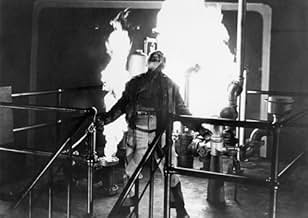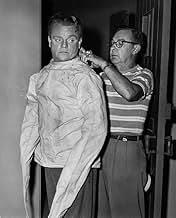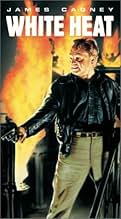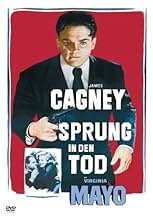CALIFICACIÓN DE IMDb
8.1/10
37 k
TU CALIFICACIÓN
Un criminal psicópata escapa de la prisión audazmente y lidera a su antigua banda en un atraco en una planta química.Un criminal psicópata escapa de la prisión audazmente y lidera a su antigua banda en un atraco en una planta química.Un criminal psicópata escapa de la prisión audazmente y lidera a su antigua banda en un atraco en una planta química.
- Dirección
- Guionistas
- Elenco
- Nominado a 1 premio Óscar
- 1 premio ganado y 2 nominaciones en total
Joel Allen
- Operative
- (sin créditos)
Claudia Barrett
- Cashier
- (sin créditos)
Ray Bennett
- Guard
- (sin créditos)
Marshall Bradford
- Chief of Police
- (sin créditos)
Chet Brandenburg
- Convict
- (sin créditos)
John Butler
- Motorist at Gas Station
- (sin créditos)
Robert Carson
- Agent at Directional Map
- (sin créditos)
Bill Cartledge
- Car-Hop at Drive-In Theatre
- (sin créditos)
Bill Clark
- Guard
- (sin créditos)
Leo Cleary
- Railroad Fireman
- (sin créditos)
- Dirección
- Guionistas
- Todo el elenco y el equipo
- Producción, taquilla y más en IMDbPro
Opiniones destacadas
White Heat is directed by Raoul Walsh and adapted by Ivan Goff & Ben Roberts from a story suggested by Virginia Kellogg. It stars James Cagney, Virginia Mayo, Edmond O'Brien, Steve Cochran & Margaret Wycherly. Music is by Max Steiner and photography by Sidney Hickox.
Cody Jarrett (Cagney) is the sadistic leader of a violent and ruthless gang of thieves. Unnervingly devoted to his mother (Wycherly) and afflicted by terrible headaches since childhood, Cody is one bad day away from being a full blown psychotic. That day is coming soon, and everyone in his way is sure to pay.
Around the time of White Heat being released, two things were evident as regards its star and its themes. One is that it had been a long time since a gangster, and a truly vicious one at that, had thrilled or frightened a cinema audience. The Production Code and a change in emotional value due to World War II had seen the genuine career gangster all but disappear. Second thing of note is that Cagney was stung by the disappointing performance of Cagney Productions. So after having left Warner Brothers in 1942, the diminutive star re-signed for the studio and returned to the genre he had almost made his own in the 30s. He of course had some say in proceedings, such as urging the makers to ensure a crime does not pay motif, but all told he needed a hit and the fit with Raoul Walsh and the psychotic Jarrett was perfect. It may not be his best acting performance, but it's certainly his most potent and arguably it's the cream of the gangster genre crop.
The inspiration for the film is mostly agreed to be the real life criminals: Ma Barker, Arthur "Doc" Barker and Francis Crowley. A point of worth being that they were all 30s criminals since White Heat very much looks and feels like a 30s movie. Cagney for sure is older (he was 50 at the time) and more rotund, but he and the film have the presence and vibrancy respectively to keep it suitably in period and in the process becoming the last of its kind. White Heat is that rare old beast that manages to have a conventional action story at its core, yet still be unique in structure and portrayal of the lead character. Neatly crafted by Walsh around four Cody Jarrett "moments" of importance, the Oedipal tones playing out between Cody and his Ma make for an uneasy experience, but even then Walsh and the team pull a rabbit out the hat by still garnering sympathy for the crazed protagonist. It sounds nutty, but it really is one of the big reasons why White Heat is the great film that it is. Another reason of course is "those" special scenes, two of which are folklore cinematic legends now. Note legend number 1 as Cody, incarcerated, receives bad news, the reaction is at once terrifying and pitiful (note the extras reaction here since they didn't know what was coming). Legend number 2 comes with "that" ending, forever quotable and as octane ignited finale's go it takes some beating.
As brilliant and memorable as Cagney is, it's not, however, a one man show. He's superbly directed by Walsh, with the great director maintaining a pace and rhythm to match Cody Jarrett's state of mind. And with Steiner (Angels With Dirty Faces/Casablanca/Key Largo) scoring with eerie strands and strains, and Hickox (The Big Sleep/To Have and Have Not) adding noir flourishes for realism and atmosphere, it's technically a very smart picture. The supporting cast in the face of Cagney's barnstorming come up with sterling work. Wycherly is glorious as the tough and tetchy Ma Jarrett and O'Brien is needed to be spot on in the film's second most important role; a role that calls for him to not only be the first man Cody has ever trusted, but also as some sort of weird surrogate mother! Mayo isn't called on to do much, but she's gorgeous and sexy and fatalistic in sheen. While Cochran holds his end up well as the right hand man getting ideas above his station.
White Heat is as tough as they come, a gritty pulsating psycho drama that has many visual delights and scenes that are still as powerful and as shocking some 60 odd years since it first hit the silver screen. What is often forgotten, when yet another clip of the brilliant ending is shown on TV, is that it's also a weird and snarky piece of film. All told, it is blisteringly hot. 10/10
Cody Jarrett (Cagney) is the sadistic leader of a violent and ruthless gang of thieves. Unnervingly devoted to his mother (Wycherly) and afflicted by terrible headaches since childhood, Cody is one bad day away from being a full blown psychotic. That day is coming soon, and everyone in his way is sure to pay.
Around the time of White Heat being released, two things were evident as regards its star and its themes. One is that it had been a long time since a gangster, and a truly vicious one at that, had thrilled or frightened a cinema audience. The Production Code and a change in emotional value due to World War II had seen the genuine career gangster all but disappear. Second thing of note is that Cagney was stung by the disappointing performance of Cagney Productions. So after having left Warner Brothers in 1942, the diminutive star re-signed for the studio and returned to the genre he had almost made his own in the 30s. He of course had some say in proceedings, such as urging the makers to ensure a crime does not pay motif, but all told he needed a hit and the fit with Raoul Walsh and the psychotic Jarrett was perfect. It may not be his best acting performance, but it's certainly his most potent and arguably it's the cream of the gangster genre crop.
The inspiration for the film is mostly agreed to be the real life criminals: Ma Barker, Arthur "Doc" Barker and Francis Crowley. A point of worth being that they were all 30s criminals since White Heat very much looks and feels like a 30s movie. Cagney for sure is older (he was 50 at the time) and more rotund, but he and the film have the presence and vibrancy respectively to keep it suitably in period and in the process becoming the last of its kind. White Heat is that rare old beast that manages to have a conventional action story at its core, yet still be unique in structure and portrayal of the lead character. Neatly crafted by Walsh around four Cody Jarrett "moments" of importance, the Oedipal tones playing out between Cody and his Ma make for an uneasy experience, but even then Walsh and the team pull a rabbit out the hat by still garnering sympathy for the crazed protagonist. It sounds nutty, but it really is one of the big reasons why White Heat is the great film that it is. Another reason of course is "those" special scenes, two of which are folklore cinematic legends now. Note legend number 1 as Cody, incarcerated, receives bad news, the reaction is at once terrifying and pitiful (note the extras reaction here since they didn't know what was coming). Legend number 2 comes with "that" ending, forever quotable and as octane ignited finale's go it takes some beating.
As brilliant and memorable as Cagney is, it's not, however, a one man show. He's superbly directed by Walsh, with the great director maintaining a pace and rhythm to match Cody Jarrett's state of mind. And with Steiner (Angels With Dirty Faces/Casablanca/Key Largo) scoring with eerie strands and strains, and Hickox (The Big Sleep/To Have and Have Not) adding noir flourishes for realism and atmosphere, it's technically a very smart picture. The supporting cast in the face of Cagney's barnstorming come up with sterling work. Wycherly is glorious as the tough and tetchy Ma Jarrett and O'Brien is needed to be spot on in the film's second most important role; a role that calls for him to not only be the first man Cody has ever trusted, but also as some sort of weird surrogate mother! Mayo isn't called on to do much, but she's gorgeous and sexy and fatalistic in sheen. While Cochran holds his end up well as the right hand man getting ideas above his station.
White Heat is as tough as they come, a gritty pulsating psycho drama that has many visual delights and scenes that are still as powerful and as shocking some 60 odd years since it first hit the silver screen. What is often forgotten, when yet another clip of the brilliant ending is shown on TV, is that it's also a weird and snarky piece of film. All told, it is blisteringly hot. 10/10
White Heat" shows the influence of film noir that was so popular in the 40's an 50's. Here, Cagney's gangster persona has come full circle back to the viciousness of Tom Powers in "Public Enemy". The big difference is that in this film Cagney's mother is no cream puff. She is, in fact, probably a bigger criminal in thought if not in deed than Cagney's Cody Jarrett.
This late entry into Cagney's gangster filmology shows technology and thus the law gaining on the criminal, with electronic gadgets and undercover lawmen with college degrees in psychology replacing the determined hard-boiled detectives and beat cops of the past. It very much looks forward to the Dragnet series that is to emerge in the 50's.
Virginia Mayo plays Verna, the fur coat loving unfaithful wife to Cagney's psychopathic criminal character Cody Jarrett. She has the hots for a member of Cody's gang, Big Ed (Steve Cochran). Even with his dark menacing presence, Cochran acts like a scared rabbit at the idea of dealing with Cody's wrath - Cagney has that much screen presence here. Edmund O'Brien is great as the undercover cop who has to stay on his toes to keep Cody believing he is on his side and win his confidence. Anything less than a convincing performance would be deadly. O'Brien always impressed me as someone who, like Cagney, could play either a guy with a white or black hat, depending on what the role called for.
Best scene without giving away the ending. Cody chewing on a chicken leg asking a guy in the trunk of the car how he's doing. When he complains it is stuffy Cody pumps the trunk full of lead. He now has the air he needs, not that he is in any condition to breathe anymore.
This late entry into Cagney's gangster filmology shows technology and thus the law gaining on the criminal, with electronic gadgets and undercover lawmen with college degrees in psychology replacing the determined hard-boiled detectives and beat cops of the past. It very much looks forward to the Dragnet series that is to emerge in the 50's.
Virginia Mayo plays Verna, the fur coat loving unfaithful wife to Cagney's psychopathic criminal character Cody Jarrett. She has the hots for a member of Cody's gang, Big Ed (Steve Cochran). Even with his dark menacing presence, Cochran acts like a scared rabbit at the idea of dealing with Cody's wrath - Cagney has that much screen presence here. Edmund O'Brien is great as the undercover cop who has to stay on his toes to keep Cody believing he is on his side and win his confidence. Anything less than a convincing performance would be deadly. O'Brien always impressed me as someone who, like Cagney, could play either a guy with a white or black hat, depending on what the role called for.
Best scene without giving away the ending. Cody chewing on a chicken leg asking a guy in the trunk of the car how he's doing. When he complains it is stuffy Cody pumps the trunk full of lead. He now has the air he needs, not that he is in any condition to breathe anymore.
Warner Brothers decided to kill off their cycle of gangster films with WHITE HEAT. A pity perhaps but what a film to end their success on . Cagney will always be remembered for playing gangsters and Cody Jarret is his most memorable performance , but Ivan Goff and Ben Roberts script is nearly as memorable as Cagney due to its high level of intelligence . I especially liked the way the gang tried to test Fallon by leaving the photograph of his wife on the table in the prison cell , little touches like that make WHITE HEAT a classic . If it was made nowadays we`d get bad language , graphic sex, bloodbaths and post modernist references to pop culture . Well you can keep all that Quentin Tarantino rubbish , this is how a good film should be made . Top of the world
Cagney's ability to shock is constant and each new gangster he creates shows a new facet of the psychopathic mind. White heat is the perfect antidote to the earlier movies- the structure where good triumphs in the last reel is still there but the killer, out of control is far less romanticised- if only current directors could develop this message. Cody Jarrett is the product of an over protective mother and thug father in the classic pattern. His whole view of the world is simplistic without subtlety or shade. Like all people of his type his self-confidence betrays him because he sees other people as stereotypes and while he has insight into the sorts of people who form his support network, he, very unwisely, dismisses the intelligence of the opposition. Like all gangsters, he has very little grasp of the outside world- throughout the film he is trapped in boxes, just like the man he kills in the boot of his car. Cagney's portrayal is his greatest role- his avoidance of pathos and his refusal to bend emotionally mean that we are never invited to pity him- wherever there seems to be a point of access for the audience he delivers the lines with a flatness which denies us sympathy. His maudlin obsession with his mother invites us to loathe his infantile mental paralysis.
Not enough comments praise the real co-star: Margaret Wycherley. She is a sinister mother who can handle the police and the gang and Cody's wife. Her world-weary cynicism, her obsession with her son delivered in the same dead-pan style is such a total antithesis to the usual hollywood 'caring parent' model that she raises the character to the level of an Empress Livia or an Agrippina. The final scene works on multiple levels- the good-guy cannot easily destroy the villain- does the world blow up in Cody's face or are we being told that the Jarretts of the world will dominate until they bring the universe to destruction? A film which still demands analysis and does more to reveal the nature of criminal amorality than anything Tarrantino or Scorsese could produce- The latter types of director are too caught up in the 'romance' of the villainous life- they need to develop Raoul Walsh's objectivity and Cagney's penetration. It is Cagney's unequivocal hatred of the character he's portraying and the personal honesty which allows him to objectify both the character he is playing and himself as an actor that makes the whole thing work. The crude method actors we're stuck with today could learn a lot from his Cody Jarrett!
Not enough comments praise the real co-star: Margaret Wycherley. She is a sinister mother who can handle the police and the gang and Cody's wife. Her world-weary cynicism, her obsession with her son delivered in the same dead-pan style is such a total antithesis to the usual hollywood 'caring parent' model that she raises the character to the level of an Empress Livia or an Agrippina. The final scene works on multiple levels- the good-guy cannot easily destroy the villain- does the world blow up in Cody's face or are we being told that the Jarretts of the world will dominate until they bring the universe to destruction? A film which still demands analysis and does more to reveal the nature of criminal amorality than anything Tarrantino or Scorsese could produce- The latter types of director are too caught up in the 'romance' of the villainous life- they need to develop Raoul Walsh's objectivity and Cagney's penetration. It is Cagney's unequivocal hatred of the character he's portraying and the personal honesty which allows him to objectify both the character he is playing and himself as an actor that makes the whole thing work. The crude method actors we're stuck with today could learn a lot from his Cody Jarrett!
Cody Jarrett (James Cagney) is the ruthless, deranged leader of a criminal gang. Although married to Verna (Virginia Mayo), Jarrett is overly attached to his equally crooked and determined mother, "Ma" Jarrett (Margaret Wycherly), his only real confidante.
Bosley Crowther of The New York Times called it "the acme of the gangster-prison film" and praised its "thermal intensity". Tim Dirks on the website Filmsite.org writes that the film may have also inspired many other successful films.
Bottom line: can James Cagney make a bad gangster film? I think not. The only way you can make a gangster film better than a Cagney film, is by having one with Cagney, Paul Muni and Edward G. Robinson. But that is just not going to happen.
Bosley Crowther of The New York Times called it "the acme of the gangster-prison film" and praised its "thermal intensity". Tim Dirks on the website Filmsite.org writes that the film may have also inspired many other successful films.
Bottom line: can James Cagney make a bad gangster film? I think not. The only way you can make a gangster film better than a Cagney film, is by having one with Cagney, Paul Muni and Edward G. Robinson. But that is just not going to happen.
¿Sabías que…?
- TriviaThe character of Cody Jarrett was based on New York murderer Francis Crowley, who engaged in a pitched battle with police in the spring of 1931 at the age of 18. Before his execution in the electric chair on 1/21/32, Crowley's last words were, "Send my love to my mother."
- ErroresThe gas station attendant removes the radiator cap with his bare hand.
- Citas
Cody Jarrett: Made it, Ma! Top of the world!
- Créditos curiososMax Steiner altered the Warner Brothers familiar introductory theme to segue directly into his theme for the opening credits,
- Versiones alternativasAlso Available in a Colorized Version.
- ConexionesEdited into Cliente muerto no paga (1982)
- Bandas sonorasFive O'Clock Whistle
(1940) (uncredited)
Music by Josef Myrow, Kim Gannon & Gene Irwin
Played on a radio
Selecciones populares
Inicia sesión para calificar y agrega a la lista de videos para obtener recomendaciones personalizadas
- How long is White Heat?Con tecnología de Alexa
Detalles
- Fecha de lanzamiento
- País de origen
- Idioma
- También se conoce como
- White Heat
- Locaciones de filmación
- 198th Street and Figueroa, Torrance, California, Estados Unidos(final scene at Shell Oil plant)
- Productora
- Ver más créditos de la compañía en IMDbPro
Taquilla
- Presupuesto
- USD 1,300,000 (estimado)
- Total a nivel mundial
- USD 5,534
- Tiempo de ejecución
- 1h 54min(114 min)
- Color
- Relación de aspecto
- 1.37 : 1
Contribuir a esta página
Sugiere una edición o agrega el contenido que falta




































